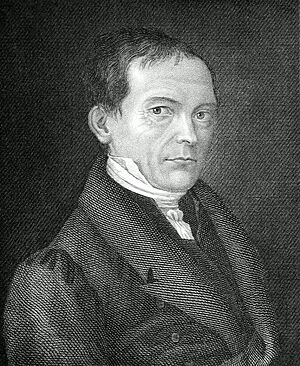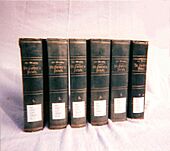Wilhelm Martin Leberecht de Wette facts for kids
Wilhelm Martin Leberecht de Wette (born 1780, died 1849) was an important German scholar. He studied religion and the Bible. He became a professor and wrote many books about these subjects.
Contents
His Early Life and Education
Wilhelm de Wette was born on January 12, 1780, in a small town called Ulla in Germany. His father was a pastor, which is a religious leader. When Wilhelm was a boy, he went to a special school called a gymnasium in the nearby city of Weimar. There, he was greatly influenced by a famous writer named Johann Gottfried von Herder.
In 1799, de Wette started studying religion at the University of Jena. His main teachers were J. J. Griesbach and H. E. G. Paulus. He worked hard and earned his doctorate degree in 1804. After that, he became a private teacher at the same university.
Becoming a Professor
In 1807, de Wette became a professor of religion at the University of Heidelberg. He then moved to a similar job in 1810 at the new Friedrich Wilhelm University in Berlin. There, he became good friends with another important scholar, Friedrich Schleiermacher.
However, in 1819, de Wette lost his job in Berlin. This happened because he wrote a letter to comfort the mother of a student who had committed a crime. Even though many people at the university tried to help him, he was not only fired but also told to leave the Prussian kingdom.
Life After Berlin
After leaving Berlin, de Wette moved to Weimar. He spent his time working on an important collection of writings by Martin Luther, a key figure in Christian history. He also wrote a novel called Theodor oder die Weihe des Zweiflers (Theodor or the Consecration of the Doubter). This book was about how an evangelical pastor is educated.
De Wette also started preaching, and he became very popular. In 1822, he accepted a new job as a professor of religion at the University of Basel in Switzerland. Even though some people didn't want him there, he quickly became very influential. He helped the university, especially its religion department, become much stronger. He even became the head of the university.
His Family Life
Wilhelm de Wette was married three times during his life. His first wife was Eberhardine Boye. His second wife was Henriette, who was a widow with a son named Charles Beck. His third marriage was in 1833 to Sophie, who was also a widow.
His Important Studies
De Wette made many important contributions to the study of the Bible and religion. In his 1805 doctoral paper, he suggested that a "book of law" found in the temple (mentioned in the Bible in 2 Kings 22) was actually the Book of Deuteronomy. This idea was very important for how scholars later studied the Pentateuch, which are the first five books of the Bible.
He also had a talent for poetry and wrote a play. He was interested in art, church music, and church buildings. Some people thought his way of studying the Bible was very critical. However, he tried to understand religious feelings, which other scholars at the time did not always do. His work is known for being fair and clear, and it is still valued today.
His Death
Wilhelm de Wette passed away in Basel, Switzerland, on June 16, 1849.
Selected Works
Here are some of his most important books:
- Beiträge zur Einleitung in das Alte Testament (Contributions to the Introduction of the Old Testament. 1806–1807)
- Kommentar über die Psalmen (Commentary on the Psalms. 1811)
- Lehrbuch der hebräisch-jüdischen Archäologie (Textbook of Hebrew-Jewish Archaeology. 1814)
- Über Religion und Theologie (On Religion and Theology. 1815)
- Lehrbuch der christlichen Dogmatik (Textbook of Christian Dogmatics. 1813-1816)
- Lehrbuch der historisch-kritischen Einleitung in die Bibel (Textbook of the Historical-Critical Introduction to the Bible. 1817)
- Christliche Sittenlehre (Christian Moral Teaching. 1819–1821)
- Einleitung in das Neue Testament (Introduction to the New Testament. 1826)
- Religion, ihr Wesen, ihre Erscheinungsform, und ihr Einfluss auf das Leben (Religion, its nature, its appearance, and its influence on life. 1827)
- Das Wesen des christlichen Glaubens (The Essence of the Christian Faith. 1846)
- Kurzgefasstes exegetisches Handbuch zum Neuen Testament (Concise Exegetical Handbook on the New Testament. 1836–1848)
De Wette also helped edit the works of Martin Luther.
Selected Works Online
You can find some of his works online through Google Books:
- Dr. Martin Luthers Briefe, Sendschreiben und Bedenken: vollständig aus den verschiedenen Ausgaben seiner Werke und Briefe, aus andern Büchern und noch unbenutzten Handschriften gesammelt, kritisch und historisch bearbeitet, 5 volumes, Berlin: Georg reimer, volume 6, edited by Johann Karl Seidemann - in German and Latin.
- Volume 1, 1825
- Volume 2, 1826
- Volume 3, 1827
- Volume 4, 1827
- Volume 5, 1828
- Volume 6, 1856
- Lehrbuch der historisch-kritischen Einleitung in die Bibel Alten und Neuen Testamentes, First Part, Berlin: Georg Reimer, 1852
- Commentar über die Psalmen nebst beigefügter Übersetzung, fifth edition, edited by Dr. Gustav Baur, Professor of Theology at the University of Giessen, 1811, 1856.
- An Historico-Critical Introduction to the Canonical Books of the New Testament, translated by Frederick Frothingham, Boston: Crosby, Nichols and Company, 1858
- Lehrbuch der hebräisch-jüdischen Archäologie nebst einem Grundrisse der hebräisch-jüdischen Geschichte, 4th edition, Leipzig: F.C.W. Vogel, 1864
- Christliche Sittenlehre, Berlin, 1819
 | Dorothy Vaughan |
 | Charles Henry Turner |
 | Hildrus Poindexter |
 | Henry Cecil McBay |



